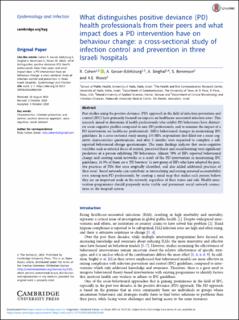| dc.contributor.author | Cohen, Ricky | |
| dc.contributor.author | Gesser-Edelsburg, Anat | |
| dc.contributor.author | Singhal, Arvind | |
| dc.contributor.author | Benenson, Shmuel | |
| dc.contributor.author | Moses, Allon E. | |
| dc.date.accessioned | 2021-07-02T15:28:06Z | |
| dc.date.available | 2021-07-02T15:28:06Z | |
| dc.date.created | 2021-01-18T14:02:52Z | |
| dc.date.issued | 2020 | |
| dc.identifier.citation | Epidemiology and Infection. 148, e259 | en_US |
| dc.identifier.issn | 0950-2688 | |
| dc.identifier.uri | https://hdl.handle.net/11250/2763145 | |
| dc.description.abstract | Past studies using the positive deviance (PD) approach in the field of infection prevention and control (IPC) have primarily focused on impacts on healthcare-associated infection rates. This research aimed to determine if health professionals who exhibit PD behaviours have distinctive socio-cognitive profiles compared to non-PD professionals, and to examine the impact of a PD intervention on healthcare professionals’ (HPs) behavioural changes in maintaining IPC guidelines. In a cross-sectional study among 135 HPs, respondents first filled out a socio-cognitive characteristics questionnaire, and after 5 months were requested to complete a selfreported behavioural change questionnaire. The main findings indicate that socio-cognitive variables such as external locus of control, perceived threat and social learning were significant predictors of a person exhibiting PD behaviours. Almost 70% of HPs reported behavioural change and creating social networks as a result of the PD intervention in maintaining IPC guidelines, 16.9% of them are a ‘PD boosters’ (a new group of HPs who have adopted the positive practices of PDs that were originally identified, and also added additional practices of their own). Social networks can contribute to internalizing and raising personal accountability even among non-PD professionals, by creating a mind map that makes each person believe they are an important node in the network, regardless of their status and role. Health intervention programmes should purposely make visible and prominent social network connections in the hospital system. | en_US |
| dc.language.iso | eng | en_US |
| dc.rights | Navngivelse 4.0 Internasjonal | * |
| dc.rights.uri | http://creativecommons.org/licenses/by/4.0/deed.no | * |
| dc.subject | characteristics | en_US |
| dc.subject | infection prevention and control | en_US |
| dc.subject | positive deviance approach | en_US |
| dc.subject | sociocognitive | en_US |
| dc.subject | social network | en_US |
| dc.title | What distinguishes positive deviance (PD) health professionals from their peers and what impact does a PD intervention have on behaviour change: a cross-sectional study of infection control and prevention in three Israeli hospitals | en_US |
| dc.type | Peer reviewed | en_US |
| dc.type | Journal article | en_US |
| dc.description.version | publishedVersion | en_US |
| dc.subject.nsi | VDP::Samfunnsvitenskap: 200 | en_US |
| dc.source.volume | 148 | en_US |
| dc.source.journal | Epidemiology and Infection | en_US |
| dc.identifier.doi | https://doi.org/10.1017/S0950268820002484 | |
| dc.identifier.cristin | 1873306 | |
| dc.source.articlenumber | e259 | en_US |
| cristin.ispublished | true | |
| cristin.fulltext | original | |
| cristin.qualitycode | 1 | |

